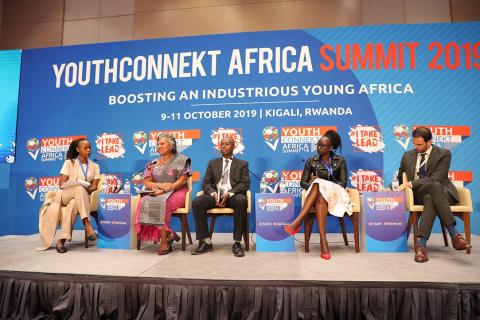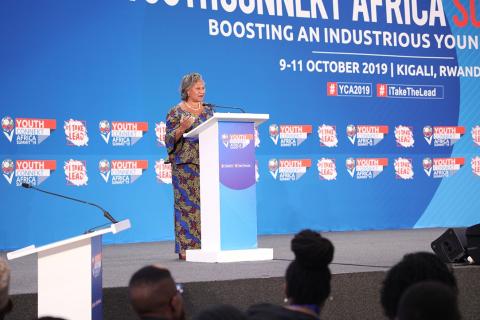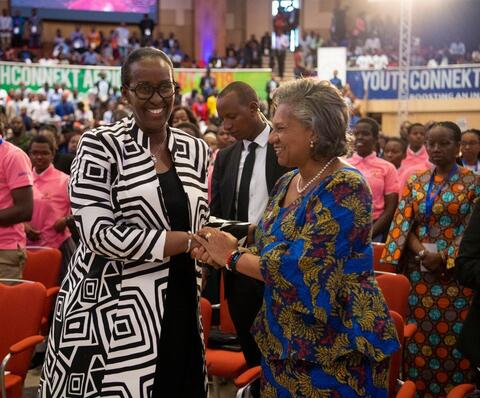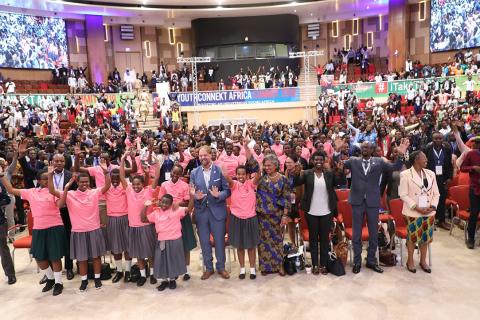Rwanda President H.E. Paul Kagame was the guest of honour in the Opening Ceremony of the 2019 Youth Connekt Africa Summit, hosted by Rwanda’s Ministry of Youth, the United Nations Development Programme (UNDP) and the Korea International Cooperation Agency (KOICA) from 9 to 11 October in Kigali, Rwanda. The Summit brought together over 10,000 delegates from across the continent and beyond, with 91 countries represented, to discuss a wide array of issues under this year’s theme, “Boosting an Industrious Young Africa”. It provided a great platform and audience to discuss exactly how and why youth health, employment and economic empowerment are deeply interconnected and why investing in youth is central to the achievement of the SDGs.
“While there is responsibility for governments to create the best environment for youth, know that there is your role to play, because even if you were in a place where the government is doing its best and providing everything, that’s not enough until you, the young people, are making an effort to tap into what’s available for you to grow.” (Rwanda President H.E. Paul Kagame).
Only a few weeks earlier, WHO Director General Tedros Adhanom Ghebreyesus and President Kagame published an article in the Financial Times in which they stressed how history shows health is the foundation of African prosperity; “good health enables people to learn and earn, to start businesses and to thrive,'' they added. With young people making up about 60% of Africa’s population, investing in the continent’s youthful human capital has never been more critical than today to ensure the economic growth of countries.
What is Youth Connekt?
The YouthConnekt programme is a multifaceted, youth empowerment model launched in Rwanda in 2012 to focus and leverage youth employability, entrepreneurship and civic engagement through innovation. Building on its positive impact in Rwanda, the programme has been embraced as a high-impact solution for African countries to realize a demographic dividend. To date, 12 countries have launched the YouthConnekt programme and many others are in the process of implementing the model under the YouthConnekt Africa umbrella. The YouthConnekt Africa Summit is an annual convening that connects youth from across the continent with policy influencers, program leaders, private sector, and non-governmental institutions to discuss and formulate youth empowerment implementation strategies through strategic partnerships.
Building on 2017-18 engagement, UNFPA in 2019 led two sessions to highlight the important links between youth health and well-being, in particular around the critical issue of teenage pregnancy, and economic empowerment and development. Dr Julitta Onabanjo, UNFPA’s Regional Director for East and Southern Africa (ESAR), was among the high-level delegates at the Summit, participating both as panelist and guest of honour across several events.
Youth Well-Being = Economic Growth?
The first session organised by UNFPA focused on the topical theme of Universal Health Coverage (UHC), looking at the link between good health, youth well-being and economic growth. The panelists discussed health financing and the returns on investing in young people’s health, particularly ensuring universal access to sexual and reproductive health and rights (SRHR) services. The meaning of harnessing the Demographic Dividend for Africa, population dynamics, human resource for health and important investments in the social determinants of health were discussed in the session. Panelists included: Dr Onabanjo; Mr Yusuf Murangwa, Director General of the National Institute of Statistics (NISR); Mr Aghassi Mkrtchyan, World Bank Senior Country Economist; and Ms Grace Amme, Communication and Marketing Associate at Outbox Hub, Uganda.

Panelists called for political commitment in the implementation of UHC and the integration of the SRH elements, especially on Adolescent Sexual Reproductive Health, as part of the essential minimum package to ensure more adolescents can receive information on SRHR. African countries were pressed to establish stronger laws on Gender Based Violence (GBV), including laws against child marriage, which are absent in 24 countries. The absence of a quality health insurance system in many countries was also discussed as a bottleneck towards the achievement of Universal Health Coverage with the goal of leaving no one behind.
“We need to invest in health to be wealthy, and Universal Health Coverage is the way there." (Mr Aghassi Mkrtchyan, World Bank Senior Country Economist)
“We can deny the evidence but the cost of inaction is a big loss to the individuals and the government.” (Dr Yusuf Murangwa, Director General of the National Institute of Statistics)
Teenage Pregnancy: Why we are still talking about it?

While the first session examined the macro-economics, the large-scale economic factors, of health investment and economic development, the second session dug deeper into one of the key issues preventing young girls from achieving their full potential. Teen pregnancy is not only a main cause of major concern for too many young girls, as well as their parents and policy makers, but it is one of the key factors hindering adolescents from reaching their full potential, affecting school dropout rates and being a high contributor to maternal mortality rates in this group. With approximately 95% of teenage pregnancies occurring in developing countries - 36.4 million women becoming mothers before age 18 - Sub-Saharan Africa has the highest prevalence of teenage pregnancy in the world (UNFPA, 2013).
The session focused on the achievements and gaps on the continent in addressing teenage pregnancy. Celebrating the International Day of the Girl Child (IDGC) on the 11th of October, the session recognised girl's rights and the unique challenges they face around the world with the 2019 global theme, “GirlForce: Unscripted and Unstoppable”.
Putting aside the traditional “panel session”, youth in the audience took centre stage and engaged an audience of over 2,000 people throughout the 90 minutes in different ways, through impactful storytelling and monologues, key interventions from role models, social media conversations, and finally contributions from the audience.
This session called for government implementation of Comprehensive Sexuality Education (CSE) as well as a revision of policies that currently restrict young people’s access to SRH services. Moreover, the significance of strengthening partnership with government, different development partners, civil society organizations and faith-based organizations, was highlighted to address GBV and fight for the prevention of teenage pregnancies.

The event was attended by high-level officials from Africa, including H.E. Ms Jeannette Kagame, First Lady of the Republic of Rwanda, Hon. Rosemary Mbabazi, Minister of Youth in Rwanda, Ministers of Youth in African Countries, Dr Julitta Onabanjo, UNFPA ESAR Regional Director, as well as Ambassadors, Representatives of UN agencies, young people and youth-led organizations from across Africa.
“We can truly respond to and prevent teenage pregnancy through strengthened and collaborative ecosystem of actors from various sectors”. (Ms Sandrine Umutoni, Director General of the Imbuto Foundation)
“It is unacceptable that nearly 1 in 5 of our adolescent girls are still getting pregnant. We must maintain a sense of urgency and commit to ending teenage pregnancy. We must together shift from talk to action.” (Dr Julitta Onabanjo, Regional Director for East and Southern Africa)
”We all stand for young girls and women. Forward always, backward never.” (A young girl from Fawe Girls School in the audience)




